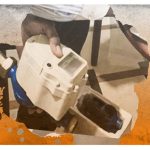Growing up in Northern Nigeria, Safiya Ibn Garba was deeply concerned about the socio-economic challenges that girls and women encountered in those conservative communities.
She was privileged to have received a quality education within and outside Nigeria. However, upon realising the stark reality of the low female literacy rate in Northern Nigeria, Safiya made a solemn commitment to become a driving force for positive change.
“I have always wanted to see that girls and women are provided with educational opportunities because when they are educated, it will allow them to have a voice in their communities and come up with practical solutions to their problems,” Safiya said.
From her humble beginnings, Safiya harboured a profound fascination for community development. She actively engaged in various programs aimed at empowering women and youth within communities grappling with conflict and gender discrimination.
In 2008, Safiya took a courageous leap by founding the Empowering Women for Excellence Initiative or EWEI. This non-profit organisation was driven by a visionary mission to implement multi-sectoral interventions, ultimately equipping young girls and women with the tools and resources needed to foster sustainable development.
“We work towards this vision through capacity building, advocacy campaigns, and cross-cutting community service projects,” Safiya told Prime Progress.
Globally, at least 463 million students were forced out of school due to the COVID-19 pandemic in 2020. This is in addition to the over 10 million children already out of school before the pandemic in Nigeria.
A year later, in response to these challenges, EWEI harnessed the power of innovation in virtual learning and garnered support from the Girls Opportunity Alliance or GOA to launch the Learning Without Limits or LWL project. This educational initiative aims to benefit 50 female students across 8 public Girls Secondary Schools in the Kaduna North, Igabi, Chikun, and Kaduna South Local Government Areas of Kaduna State.
The LWL project is dedicated to bridging the accessibility gaps in virtual learning for adolescent girls in Kaduna. It goes beyond virtual access by providing beneficiaries with essential technology tools such as Tablets, Power Banks, and Earpieces. These resources are instrumental in enhancing their proficiency in areas like Digital Marketing, Graphic Design, Climate Action, Sustainable Development Goals (SDGs), and Basic Life Skills.
Rachel Sochi Ogbonna, the project’s focal person, told Prime Progress that their deliberate choice of public school students stems from the fact that they come from low-income communities and encounter numerous challenges in accessing quality education.
“In making this selection, we partnered with the Kaduna State Ministry of Education and the project is implemented in a hybrid manner with an increased emphasis on technology-enhanced learning for the girls,” said Rachel.
Measuring impact
To assess the project’s impact, the organisation conducts in-depth interviews with parents and school administrators to gain insights into the student’s learning process.
They also conduct regular monitoring visits to evaluate the progress of the project. The students have mentors who supervise and follow up to ensure the girls learn and focus on the school and project curriculums.
“When the girls face challenges through the learning process, we ensure to work closely with their parents and school administrators to tackle it,” Rachel told Prime Progress.
The girls who have now conformed to technology in their learning processes are returning to their communities furnished with essential digital and life skills that will blossom their careers in this dynamic technology age.
Learning digital and basic life skills has transformed 15-year-old Joyce Aloma into classroom work at the Government Girl Secondary School Baban Saura.
“Apart from the digital skills like Graphic Design, I have learned how to develop problem-solving and critical thinking skills, which I’m applying in my day-to-day activities,” Joyce highlighted.
She believed that acquiring these skills would pave the way for her to pursue a future career as a digital journalist.
Victoria Ali, a 16-year-old SS 2 student selected from the Government Girls Secondary School Barnawa, has undergone a transformative experience. She now efficiently manages her time and aspires to become a Registered Nurse.
Victoria enthusiastically shares, “I have used the gadget for online research to gain insights into how I can achieve my dream.”
This project has made her digitally literate and a proactive member of her community. She proudly declares, “It has enabled me to be productive both in school and at home.”
Shortcomings
The project has encountered limited internet access challenges, primarily from glitches in the network service providers’ services.
Additionally, during the initial stages of the project, the students faced difficulties in adapting to the learning methods as it was their first exposure to virtual learning.
“We have to take time and build the capacity of the school instructors too because they were not effective in using technological devices,” Rachel narrated.
Despite these challenges, EWEI has persevered through over a decade of unwavering dedication, emerging as a prominent organisation championing women’s rights and sustainable development.
Under the guidance of its founder, the non-profit organisation has touched the lives of an impressive 766,921 individuals through its diverse range of initiatives.
With sustained support and unwavering commitment, EWEI aspires to extend its reach and impact, aiming to expand into new target areas as it wholeheartedly devotes its efforts to the empowerment and betterment of girls and women.
“We want to continue encouraging the enrollment, retention, and completion rates for girls and women in science and information technology education,” Safiya said.
Safiya Ibn Garba, deeply concerned about socio-economic challenges in Northern Nigeria, founded the Empowering Women for Excellence Initiative (EWEI) in 2008. EWEI focuses on capacity building, advocacy, and community service projects to empower girls and women. The organization launched the Learning Without Limits (LWL) project in 2021, supported by the Girls Opportunity Alliance, to provide virtual learning tools and skills in digital marketing, graphic design, and life skills to 50 girls from public schools in Kaduna State.
The project addresses accessibility and technology challenges, aiming to equip girls with essential skills for their future careers. Despite obstacles like limited internet access and initial difficulties with virtual learning, EWEI has impacted over 766,921 people and continues to advocate for girls' education in science and technology. The project involves close collaboration with parents and school administrators to ensure success and adaptability.
Girls participating in the LWL project, like Joyce Aloma and Victoria Ali, have gained valuable skills, enhancing their academic performance and career aspirations. Challenges remain, primarily related to internet access and the adaptation to new learning methods, but EWEI perseveres with the goal of expanding its reach and continuing its mission to empower girls and women through education.






